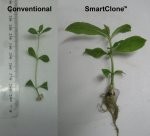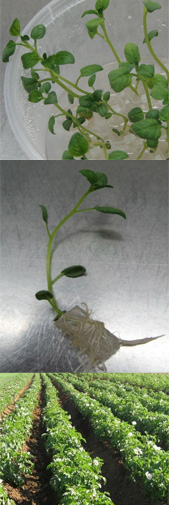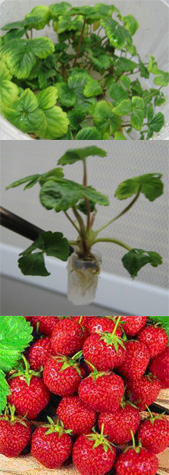Applications
Timber
The world market for forestry is massive, with plantations requiring nearly nine billion seedlings annually, despite most timber being harvested from native forests. Most of these plantations are from unimproved seed. The use of genetically improved seeds leads to large improvements in growth rates and quality. Where clonal systems are available, such as with hybrid aspen and tropical eucalypts, massive improvements are obtained.
In forestry many costs are generally fixed - including land purchase, site preparation, plantation establishment and management. Quite modest improvements in growth can therefore translate into relatively large improvements in profitability. Using NuPlant’s SmartClone™ approach, the forest industry can in principle be changed from a relatively low return industry to one of high return.
Teak
NuPlant has developed over several years tissue culture systems for teak, Tectona grandis, and has clearly demonstrated the viability of its SmartClone™ system with this species. Teak plantlets produced through the SmartClone™ system show enhanced robustness for easier transfer ex-vitro and a head-start for nursery growth. Compared to typical tissue-culture products, SmartClone™ teak plantlets have thicker stems (up to three-fold diameter), multiple functional roots, and photosynthetic leaves – biomass is up to 10-fold higher. Nursery attrition is insignificant, labour steps are usually reduced, and residence time shortened.
Eucalyptus
NuPlant has successfully propagated eucalyptus species such as E. grandis, E. urophylla, E. camaldulensis, and some varieties of E. globulus, together with their hybrids, and are generally well-suited to propagation through the SmartClone™ system.
Pines
A number of Pinus species such as P. radiata and P. taeda are well-suited to propagation using the SmartClone™ process. Used in combination with somatic embryogenesis as a source of juvenile plants, production costs can be reduced massively.
Potatoes
Potatoes are readily propagated using the SmartClone™ system, yielding more robust plantlets than through conventional tissue culture. These potato plantlets in SmartClone™ pods can be transferred directly to soil (but require careful management). The SmartClone™ plantlet pods are readily transferred to mini-tuber production pots and grow rapidly; the pod system is amenable to automated nursery transfer. With pre-hardening plantlets have a head-start and can yield triple the normal number of minitubers, without size reduction.
Grapevines
Grapes are the world’s most important fruit. World grapevine plantings exceed 5 million ha with nearly 9 billion grapevine plants. Overall plantings are relatively static, but there is considerable “churn” due to localised “fashion” demand for particular varieties, changing land pressures, disease losses, and climate change, etc. Historically this corresponds to approximately 150 million plants per annum in established grape-growing countries. In New Zealand and Australia recent demand has been for approximately 3 million and 12 million new grapevine plants annually; the major markets are Europe (55 million), China (30 million), USA (20 million), Argentina (14 million), Chile (13 million) and Turkey (10 million). About 71% of grape production is for wine grapes, 27% fresh fruit, and 2% dried fruit.
All are clonally propagated by cutting and grafting methods. Disease transmission is a serious issue for vineyards, with tissue-culture providing an important means for propagating virus-free lines. All varieties of grapes tested have been successful in the SmartClone system.
Strawberries
Strawberries are a major clonally-propagated crop. Australian production is in the vicinity of 60,000mt of berries valued at over $300 million per annum from 80 million plants that are productive over one or two years, requiring about 60 million new plants annually. World demand has been estimated as approaching a billion plants annually. Plants originate from varieties introduced through tissue-culture but are commercially propagated through runners from mother stock. The introduction of new varieties is usually based on several hundred tissue plants per variety, with subsequent delay of several years to multiply these to provide adequate numbers of mother stock before demand for runners can be met.
NuPlant has demonstrated the ability to produce disease-free strawberry plantlets in its SmartClone™ system. This offers potential to reduce the time to establish mother-plants for runner production, and in some cases, may be used for production plants to allow earlier release of new varieties. The SmartClone™ system thereby offers a temporary alternative to runners as a source of strawberry plants to allow earlier release of new varieties. In Australia up to 50 new varieties may be introduced annually, although typically only a subset of these are suited to the Australian industry.
Earlier release of new varieties and disease control are important elements towards achieving improved quality and economic returns. The SmartClone™ system offers delivery of robust, disease-free strawberry plantlets suitable for field or hydroponic planting.
SmartClone™ - Tougher plantlets faster
SmartClone™ changes the tissue culture paradigm. NuPlant’s key technology allows conditions to be customized for each growth phase for more robust plantlets, grading for uniformity, robotic handling for laboratory efficiency, easy soil transfer, and a head start for accelerated nursery growth.






